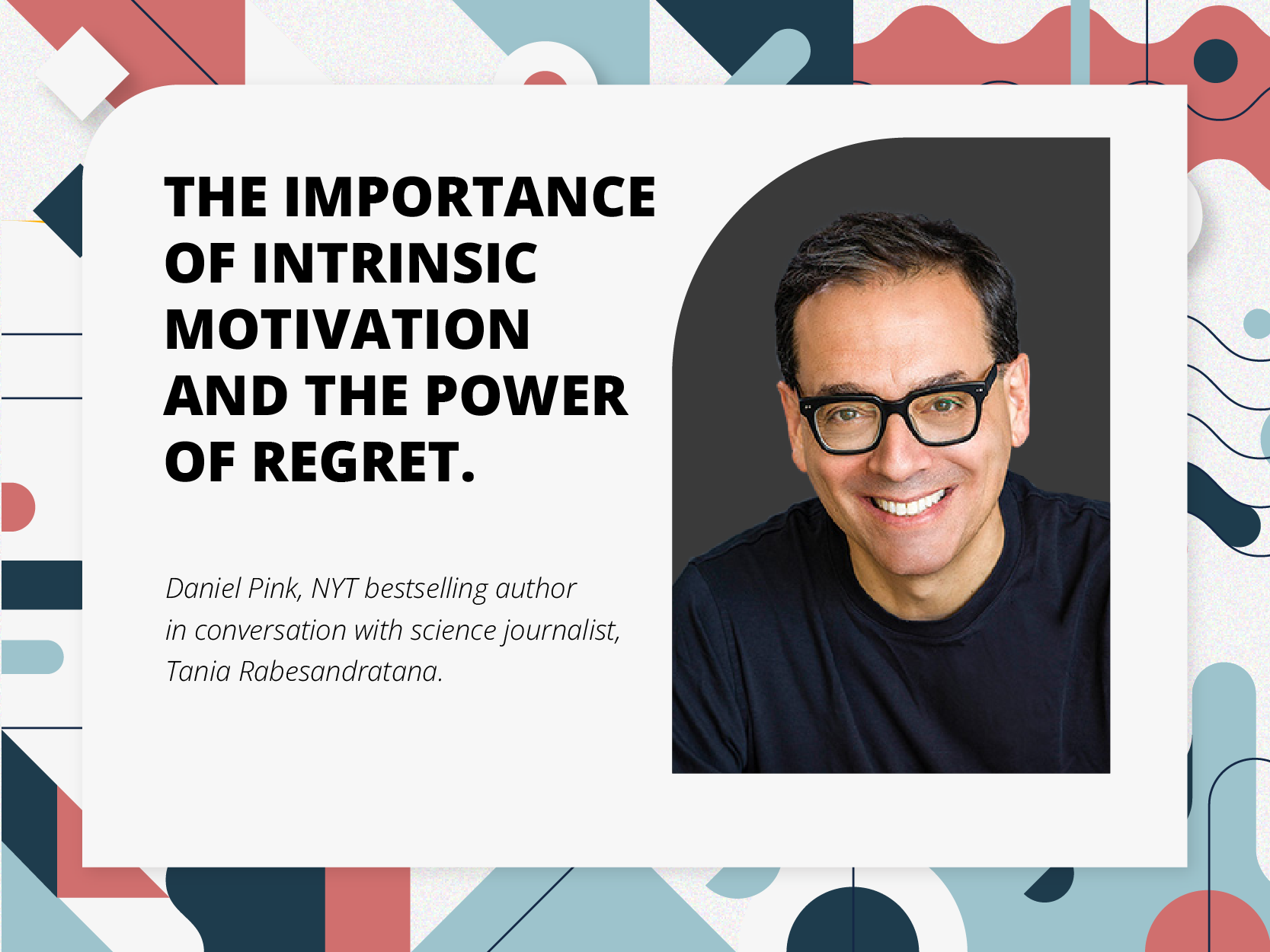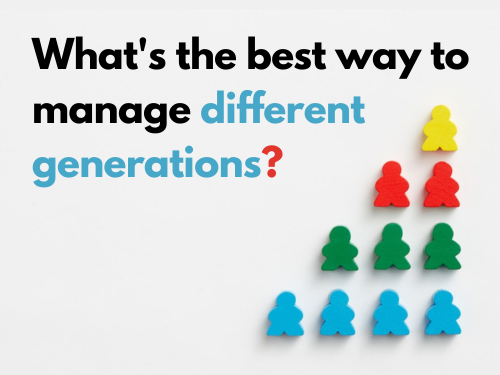For anyone with even a passing interest in motivation theory, Daniel Pink will likely need little introduction.
The author of seven books—five of which are New York Times bestsellers, including Drive: The Surprising Truth About What Motivates Us, To Sell Is Human: The Surprising Truth About Moving Others, and his latest work, The Power of Regret: How Looking Backward Moves Us Forward—Pink possesses a particular knack for turning a tangle of big (and sometimes misunderstood) ideas and academic research into approachable, thought-provoking content.
Formerly the chief speechwriter for Vice President Al Gore, Pink is also the man behind one of the most watched TED Talks ever, ‘The Puzzle of Motivation’, which has been viewed almost 40 million times on Ted.com and YouTube.

Daniel Pink is the author of seven books, five of which are New York Times bestsellers, including ‘Drive’, ‘To Sell is Human’, and ‘The Power of Regret’.
In this interview with science journalist and Attuned Writer Fellowship awardee Tania Rabesandratana, Pink talks about why intrinsic motivation is vital for high performance in any field, why some organizations are still getting it wrong, and how regret can be a surprisingly powerful motivator.
Let’s start with the basics: Why is intrinsic motivation so powerful?
I think it’s so powerful because it’s a fundamental part of being human. And it is an often neglected part of being human.
Sometimes we do things not because we’re biologically compelled to do them, not because we want to get a reward or a punishment, but because we like doing it. It’s enjoyable. It’s meaningful. It brings us pleasure, it brings us joy, it brings us significance. It moves us closer to a sense of purpose, a sense of meaning. We do things because it’s the right thing to do.
And my gripe, such as it is, is that in too many organizations and too many schools, we only have this two-dimensional view of human beings as essentially biological creatures with a reward and punishment drive. And we’ve neglected that intrinsic motivation drive. What’s more, is that intrinsic motivation seems to be the most important of those drives for high performance in just about any field.
And what effect does intrinsic motivation have on performance?
It depends on your goal. I might be intrinsically motivated to be a great bank teller and provide service to bank customers. And if my boss says, “Well, you have to do it for free,” I would say, no, I’m not doing that. Because it’s not fair. So there’s a complexity to this. It’s not either/or. It’s much less mechanical than I think people realize. It’s much more of a kind of ecosystem of motivation. And all these motivators work together in the ecosystem. Again, my gripe has been for years that we have neglected that third drive, we haven’t taken it seriously enough—we’ve thought of it as soft, we’ve thought of it as inessential—when in fact, it’s integral to the human condition and powerful in driving high performance in just about every area.
The domains in which people are doing simple, algorithmic, short-term work are shrinking and shrinking and shrinking, and the domains in which people are doing more complex, heuristic, conceptual, creative, longer-term work are widening and widening and widening. And so the way we have to think about this is that we have this set of motivators that were fairly effective for 19th-century work, and somewhat effective for 20th-century work. But they’re getting kind of old and tattered for most 21st century work, and so we have to come up with a better way to do things.
You published Drive in 2010. Your gripe that organizations don’t pay enough attention to intrinsic motivation—have you seen that change in the past 12 years?
Some. Some. The essential point in motivation, in organizations, and even in schools, is that there’s a certain kind of motivator that we rely on quite a bit. Psychologists call it a controlling contingent motivator; I like to call it an “if/then” reward. As in: “if you do this, then you get that.” What 60 years of research tells us is that “if/then” rewards are effective for simple tasks with short time horizons. You want somebody to stuff envelopes? Pay them per envelope, give them a bonus for every 100 envelopes, you will get more envelopes stuffed, right? There’s no question about that. However, “if/then” rewards are not very effective for complex tasks that require judgment, discernment, creativity, or with long time horizons.
The problem with “if/then” rewards is not the reward. It’s not the money. It’s the contingency, because that is a form of control. What we want, especially in schools, especially in workplaces, is neither compliance nor defiance, but engagement, and you cannot control somebody into engagement.
You describe three elements in the book that are necessary for intrinsic motivation to flourish: mastery, autonomy, and purpose. Can you briefly explain them and give us some examples of how to get those at work?
So it seems like the best motivational regime at work is this: let’s start with, you’ve got to pay people fairly. Again, the research doesn’t say that money doesn’t matter. Money matters. But it doesn’t matter in the simple mechanical way that people tend to think, where more money always gets you better performance. Money is in some ways a threshold motivator. There’s an argument that the best use of money as a motivator is to pay people enough to take the issue of money off the table. Again, let’s go back to our envelope-stuffing example. If you want people to stuff a lot of envelopes or very simple tasks, you want them to focus on the money, you want them to hear that ka-ching! every time. But if you want someone to come up with a new therapy for a drug, if you want someone to come up with a new way of organizing a school, if you want someone to come up with a product or service that other people didn’t know that they were missing, then you don’t want them focused on the money—you want them focused on the work.
So once we do that, there are three core motivators. One of them is autonomy, and autonomy is basically giving the control to the individual, so that the individual has some say over what she does, how she does it, when she does it, who she does it with.
Mastery is our desire to get better at something that matters, to improve, to learn, to grow, to make progress. Teresa Amabile at Harvard has some really great research showing that the single biggest day-to-day motivator on the job is making progress in meaningful work. So that’s mastery.
And then there’s purpose. I think that purpose is not one thing, but two things. There are two different kinds of purpose. One of them is what I call ‘capital P’ Purpose. And that is, ‘Am I doing something that matters in the world? Am I addressing the climate crisis? Am I feeding the hungry?’ But there’s also another quieter kind of purpose that I like to call ‘small p’ purpose that is equally important, and that is, am I simply making a contribution? Am I helping a teammate get a project out the door? Am I helping a customer resolve a problem? This quieter kind of ‘small p’ purpose. And so ‘capital P’ Purpose is making a difference, ‘small p’ purpose is making a contribution. And when we have jobs that allow these things, that give people a sense of autonomy, a sense of mastery, and a sense of purpose, they do well, they perform better. Period.
I want to talk about your new book, The Power of Regret: How Looking Backward Moves Us Forward. You turn the mantra of “no regrets” on its head and push us to look at regrets as a guide toward a better life. How can regret act as a source of motivation?
Let me start with some background. There are two key things we know about regret. One is that it’s integral to our cognitive machinery; everybody has regrets. This is really important. It is one of the most common emotions that human beings have. The only people who don’t have regrets are people with some kind of disorder, or little kids whose brains haven’t developed. The second thing is: Why would something that feels bad be so ubiquitous? The answer is: it’s useful. It clarifies what we value and instructs us on how to do better.
We need to actually have a new view of regret: not ignore our regrets, which I think a lot of us in this overly positive environment are encouraged to do, but also not wallow in our regrets, but actually confront our regrets: use them as information, as signals, as data.
So now, what does it teach us about motivation? I think that when you understand what people regret the most, you understand what they value the most. So as you know, I’ve collected at this point over 21,000 regrets from people in 109 countries around the world. These four core regrets keep coming up over and over again. And they operate as a reverse image of what people want out of life.

Could you give us an example of a regret that you’ve had, and how you use it as a positive drive?
I have regrets about kindness, particularly when I was younger. [Not] from being a bully, it was sort of unkindness by inaction. I was in many situations where people were not being treated well, where they were being excluded, not handled fairly. And I saw, and I didn’t do anything. And it bugs me, man.
So what do I do with that? I can do this ridiculous thing and say, “No regrets! I never look backward. I’m always positive.” Okay, that’s delusional. Or I can say: “Oh, my God, I was unkind by inaction. I’m a terrible human being, I always do this, I’m worthless!” That’s a bad idea too. What I want to do is say, wait a second, this regret that I’ve been feeling for 10 years, 20 years, 30 years, is telling me something, it’s a knock at the door. It’s telling me, okay Dan, here’s what you need to do. Now, when you see somebody being excluded, you need to say something, you need to bring that person in, you need to actually step up.
This interview has been edited for length and clarity. To read the full transcript, or to listen to the full version as a podcast, visit Why Would Anyone on Substack.
Download The State of Motivation Report 2025. It’s free!





